Sara Davidson
|July, 31, 2024
I had my first real heartbreak in Firenze (Florence) in 1962, before many of you were born.
I was on a student tour of Europe—from Scandinavia down to Italy—and our guide in Firenze was a charming and playful guy in his early thirties, Giancarlo Massetti. In Firenze, where he lived, he took me and other young women from the tour to the San Marco Bar, where he and his friends would hang out and park their motorcycles in a long row.
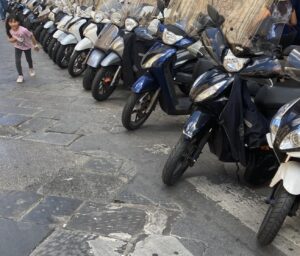 Still a major means of transportation
Still a major means of transportationAll his friends were attractive and vivacious, but one, Roberto, had the face and deep-set eyes of a statue of one of the gods. My friend, Barbara, told another woman on the tour, Lucy, to put on her glasses so she could see this guy. “I can see him,” she responded.
To my surprise, Roberto asked me to go for a walk with him, taking my arm as he led me past a few of his friends. When we returned to the bar, he kissed me and said, “I won’t be in Firenze tomorrow, I have to go to Lucca. Could I see you the day after that?”
Of course, I said. I day-dreamed about him all the next day as we toured the Uffizi gallery and stared at Botticelli’s painting, The Birth of Venus.
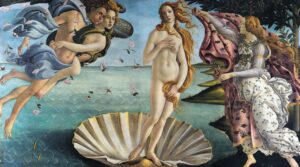
When I returned to our hotel, there was a card from Roberto postmarked from Lucca that said, in Italian, “Thinking of you. I see you tomorrow.”
The following evening, he picked me up at our hotel, we walked to a small restaurant nearby, and then he showed me some of his favorite spots in the city and we wandered back to the hotel. At one point he asked me, staring with those large eyes, “Hai conosciuto un uomo?” Have you known a man?
I shook my head, no. He smiled and pulled me closer.
He kissed me goodnight, saying, “I’ll be happy when I see you again,”and I floated up the stairs to my room, passing two of the other women on the tour, Lucy and Jan, sitting on the stairwell. We exchanged smiles and I continued happily to bed.
The next day, I learned that after dropping me off, Roberto had taken Lucy off on his motorcycle and they hadn’t returned till dawn
The worst thing was: everybody on the tour knew this, and would tease me, “Hey, Sara, Where’s Roberto?”
The next night, I stayed back at the hotel by myself, sitting by a window that looked out on a dreary air shaft, feeling foolish and humiliated.
Fortunately, the tour ended a few days later and I avoided Lucy or shot her unkind looks.
After the tour, I began my internship with Mondadori, the publisher in Milano, and in November, I took the train to Firenze to visit our guide, Giancarlo. I was wearing a cranberry-colored wool suit with a belt around the waist that I’d bought in the first department store to open in Milano, Rinascente, and felt I looked more European than American.
“You look so beautiful,” Giancarlo said when he met me at the train station. He took me to the San Marco Bar and the gang was all there. I was sitting in the middle of a group of them when Roberto spotted me and walked over.
“You remember me?” he said in Italian.
I stared at him, then said, in Italian, “Debrai?” Should I?
He took this in. “You’re right,” he said, with a glum look.
I returned to Milano and a day later, received a letter from Roberto. I asked my boss at the publishing company to translate it for me, as it was hard to read the handwriting. Glancing at it, my boss shook his head. “This guy has no class and less education.” At one point in his letter, Roberto had written, “Put a large stone on what happened before. Come to Firenze a new time. Take the sad away from my heart. Ciao bella.” (Bye, beautiful)
I wasn’t even tempted to write back; but I enjoyed the idea of him checking his mail for a response.
That was six decades ago, and none of the heartache and shame I’d felt have remained in my body. I couldn’t find them when I looked, and I was free to enjoy the splendors of Italy, especially Firenze, with my children and grandchildren.
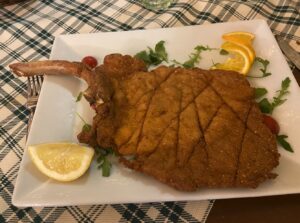 Veal, the Way it Should Be
Veal, the Way it Should BeOne of the highlights of our trip was visiting Pompei. I generally don’t enjoy walking through ruins, but this was extraordinary. The city had been destroyed almost two thousand years ago, on August 24, ’79 AD. The nearby volcano, Mt. Vesuvius, had exploded, releasing a hundred thousand times the energy of the two atomic bombs dropped on Hiroshima and Nagasaki. That’s right—two atomic bombs. A stream of poisonous gas, rock and ash rose ten miles into the air—ten miles!—and crashed down on Pompei, burying every human instantaneously.
The buried ruins of Pompei were not discovered, however, until almost two thousand years later, in 1738. Teams of scientists and historians came from all over Europe to excavate the city, a project which is said to have initiated the modern science of archeology. They found no physical traces—no bones, skin, or hair—of the estimated 2000 people buried in Pompei. All they found were hollow indentations of human forms in beds and on chairs.
In the following decades, archeologists made casts of the bodies by pouring cement into the hollows where bodies had been. The casts included people in bed, at tables or near large indoor baths decorated with friezes that illustrated stories of the gods.
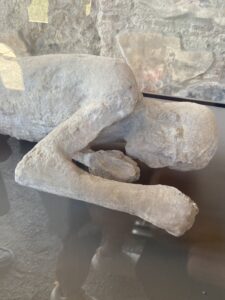 Concrete figure created from imprint left on a bed
Concrete figure created from imprint left on a bedThe size and splendor of some of the homes was startling. One, built around 200 B.C., and named the “House of the Fawn” by those who excavated it, had two living rooms, four dining rooms, two gardens, a banquet hall, a large mosaic of Alexander the Great, and several school-rooms for children.
Our kids paid close attention when our guide dropped to her knees and looked in their eyes, describing what it was like to be children living there, two thousand years ago. But then Siena and Emma would dash off to run, jump and race around the columns in the outdoor squares.
In Rome, Fay and Andrew had found an English-speaking day camp—to teach Italian kids to speak English—and arranged for the girls to attend it for a week. I wondered how they’d do, suddenly immersed in a crowd of Italian kids.
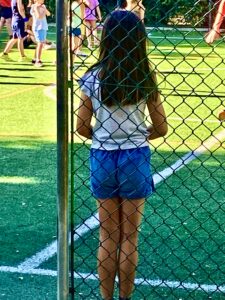 Siena first day of camp, sizing it up
Siena first day of camp, sizing it upBut they took to it immediately, ran and played with the pack, and brought home drawings and crafts they’d made.
A week after arriving in Rome, I was ready to go home, jostling my way through the crowds at the Rome airport.
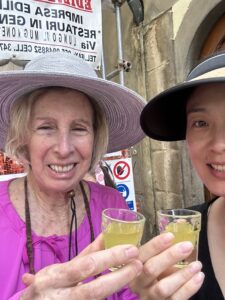 Toast to the Trip
Toast to the TripNow, it’s one month later, and I’m longing to go back.
I love your stories. Bought the Didion memoir, loved it, gave it to a friend……first found you when I was selling books in my White Mountain, NH store, and came across “Loose Change”, in a large lot of books I bought from a VT library.
Sorry to be so late in replying, but life! Ah. Thanks for your lovely words. They made me smile. Warm wishes to you, Sara
I adore this story of your experiences in Italy, especially in your youth and learning a hard lesson about such untrustworthy men! Most of us can identify with that kind of pain!
I love your missives, Sarah. And I’m delighted to know that your life is good. I rejoice in your happiness and wish only more for you. Much love, Beth
Hey Beth, always a treat to hear from you, in any way, anyhow. Hope you and your kids are doing well. Lots of love.S
One good thing about getting old is that we have lots of memories. This is a nice one Sarah
Would love to connect with you? Phone this week?
Nice to seeing you out enjoying your life. I miss seeing you
I miss you too. Can’t even remember when last we were in touch. Let’s do a call this next week?
Sara — I’ve enjoyed your Italy reports – I am an architecture docent at the Getty Villa (a recreation of the Villa dei Papirii in Herculaneum), But haven’t made it there yet…hugs to you!
What a delight Sara! You are such a good writer!
Ah these Roberto types. I get it! Glad you bounced back! Thanks for sharing your story. And, it looks like a wonderful trip to Italy with your family. Big Love to You!
Thanks, Zoe, for your kind words. I know you know about the Roberto type, but this was my first brush with it. Big love back.
I always enjoy your story telling! Loose Change and Leap are two books I loved! It’s interesting to read about your Italy experiences then and now! Thank you!
Thank you, Juilie, for your kind words. The joy of writing these blogs is hearing what others think about them. Warmest, Sara
Sara, thanks for sharing your wonderful memories, old and new!
Sara, I love hearing about your old and new adventures in Italy!
First story I read today. Smile. I’m happy to be on your blog list.
Thanks, Jean, I love hearing from you. Have a lovey day.
Sara, you make we want to pack my bags and head to Italia. Glad you enjoyed your family trip.
What a wonderful time with your family in Italy. And what memories of the “the boys.” I loved reading every line. It reminded me of my 3 months in Naples on a national science foundation fellowship studying learning in the octopus when I was 19. I learned a lot about human octopuses- the wandering hands of the young men I met during those months. Love you!
Years ago my wife and I were walking near the Spanish Stepsvin Rome. A pretty young Italian woman approached holding a sign ‘free hugs.’ How could I refuse ‘when in Rome.’ My wife said “go for it” and snapped the photo. Yes I still had my wallet afterwards. Love Italy Sara,we spent a week in Sienna
Beautiful! The story of you and Roberto, the Italian stud, was touching and not surprising. It probably happened to so many gullible young American women in Italy. Your writing is splendid, Sara.
I visited Pompeii at age 12 and it made such an impression on me!
I had a similar sleazy guy experience with someone I brought as a date to a wedding. I was more embarrassed than heartbroken, but I was also much older and more experienced in relationships than your 19 year old self.
Thanks for your kind, empathetic words about the archtypal sleazy guy. I wish my older self had been present to console the 19 year old, and assure her she would have love of a deeper more lasting kind. What made it so painful was that it was witnessed by a whole lotta people. Thankfully, the pain is gone! and I can enjoy writing about it.
Enjoyed your memory piece about Italy. I, too, met an Italian boy I’ve never forgotten during a EuroRail Pass trip with another 20 year-old friend Summer of ‘71. He described himself as a poet and insisted I take a photo of him – as if I could ever forget! Ah, the sweetness of youth! ❤️
i always love reading your writing especially about the Rabbi
Thanks for your kind words. It inspires me to keep writing these blogs. Warmest, Sara